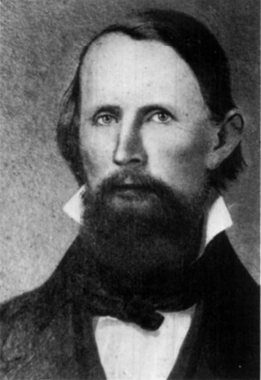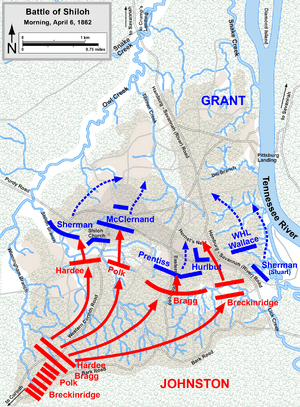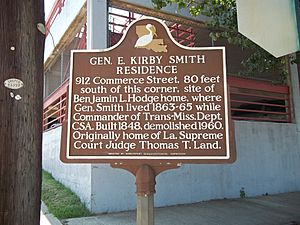Benjamin Lewis Hodge facts for kids
Quick facts for kids
Benjamin Lewis Hodge
|
|
|---|---|
 |
|
| Member of the C.S. House of Representatives from Louisiana's 5th district |
|
| In office May 2, 1864 – August 12, 1864 |
|
| Preceded by | Henry Marshall |
| Succeeded by | Henry Gray |
| Personal details | |
| Born | c. 1824 Tennessee, United States |
| Died | August 12, 1864 (aged 39–40) near Shreveport, Louisiana |
| Political party |
|
| Profession | Lawyer |
| Military service | |
| Allegiance | Confederate States of America |
| Branch/service | Confederate States Army |
| Years of service | 1861–1862 |
| Rank | Colonel |
| Commands | 19th Louisiana Infantry Regiment |
| Battles/wars | Battle of Shiloh |
Benjamin Lewis Hodge (born around 1824 – died August 12, 1864) was a politician for the Southern states during the American Civil War. He led a group of soldiers called the 19th Louisiana Infantry Regiment in the early part of the war, including during the famous Battle of Shiloh.
Hodge was born in Tennessee and later moved to Shreveport, Louisiana. There, he became a very successful lawyer and an important local politician. In late 1861, he was chosen to be a colonel for the new 19th Louisiana Regiment. However, he left the army after the Battle of Shiloh because he was sick. He then went back to politics and was elected to a special government group called the Confederate House of Representatives in 1863 without anyone running against him. He served there for a short time before he passed away in 1864.
Contents
Early Life and Career
Benjamin Lewis Hodge was born in Tennessee around 1824. We don't know much about his early life or how he was educated. By 1850, he had become a lawyer and moved to Caddo Parish, Louisiana. He owned land worth $1,000, which was a good amount of money back then.
Hodge became well-known in his area. He served several times in the state legislature. In 1852, he was elected to the state senate as a member of the Whig Party. This district included Caddo, DeSoto, and Sabine Parishes.
In 1855, Hodge helped start the American Party, also known as the Know Nothings, in Shreveport. He was elected as a state representative for Caddo Parish in 1857 as a Know Nothing. By 1860, his wealth had grown to over $100,000. He owned shops and the biggest house in Shreveport. He also invested in land and had many workers. In 1852, he married Caledonia Cash, who was the adopted daughter of a major local landowner. Two steamboats, the B. L. Hodge and B. L. Hodge No. 2, were named after him. They were built to travel on the Mississippi River and Red River.
The Civil War Begins
Benjamin Hodge had been a Whig and then a Know Nothing. He believed it was most important to keep the United States together, which was different from many Southern Democrats who focused on states' rights. In the 1860 election, he strongly supported the moderate Constitutional Union Party. He even traveled to Washington in August to speak to other Constitutional Unionists. He said that those who wanted to leave the Union were just looking for power. He believed his party was the only choice besides the Republican Party.
Before the election, he campaigned for the Constitutional Unionists in northern Louisiana. Many voters in Shreveport supported the Constitutional Union Party because of their business interests. However, landowners in the rest of Caddo Parish voted for the Southern Democrats.
After Republican Abraham Lincoln was elected president, Hodge changed his mind. He then supported leaving the Union right away. He ran for election to the state secession convention. He and another politician, Henry Marshall, easily won against opponents who wanted to delay leaving the Union. On January 26, 1861, Hodge signed the order for Louisiana to leave the United States. He then tried to be elected as a delegate to the Montgomery Constitutional Convention, which became the Provisional Congress, but he lost by a few votes.
Military Service
Hodge joined the army on April 20, 1861. He became a third lieutenant in the Shreveport Grays infantry company. This company was supposed to join the 1st Louisiana Regulars but instead became Company D of Lieutenant Colonel Charles Didier Dreux's 1st Louisiana Battalion. Hodge brought James Lewis, a free man of color, with him into service.
After serving in Pensacola, Hodge's unit moved to Virginia. They were one of the first Louisiana units to arrive there. The battalion worked as guards in the Virginia Peninsula. On July 2, Hodge left the army and returned to Louisiana with Lewis. A request to make Hodge a judge advocate general was turned down.
In November, Hodge ran for a seat in the Confederate Senate but did not win. In Shreveport, he became a captain of the Keachi Warriors. This group became Company I of the 19th Louisiana Infantry Regiment. On November 11, Hodge was elected colonel of the entire regiment.
The Battle of Shiloh
Hodge led his regiment in the 1862 Battle of Shiloh. His regiment was part of Colonel Randall L. Gibson's brigade. Around noon on April 6, the first day of the battle, the 19th Louisiana moved into Davis' wheat field. They were hit by Union fire after reaching a log cabin in the middle of the field. The Union soldiers were hidden by bushes. Hodge moved his men to hide behind a fence on the north side of the field.
During his brigade's attack on Union positions, known as the Hornet's Nest, Hodge ordered a bayonet charge. This attack failed, and his regiment lost many soldiers. They faced fire from three Union regiments and their cannons. Gibson's brigade tried several times to break the Union line but couldn't. Hodge wrote in his report that "it would have been madness to have kept my command there longer." His tired brigade was sent to the back by their commander, Major General Braxton Bragg. Hodge suggested bringing up cannons and attacking the Union line from the side at the Hornet's Nest. Bragg didn't listen to this idea at first. However, Hodge's idea proved right when the Confederates later used many cannons and side attacks to force the Hornet's Nest defenders to surrender.
That night, Hodge camped his regiment away from the rest of Gibson's brigade. On the morning of April 7, Hodge tried to rejoin Gibson's brigade. But Brigadier General Jones Withers ordered him to give command of the 19th Louisiana to its lieutenant colonel. Hodge was then put in charge of a new group of soldiers. This group included his regiment, the 25th Alabama, the Crescent Regiment, and the 5th Company of the Washington Artillery. His new group was placed on the right side of the army to support Brigadier General James R. Chalmers' brigade.
Around 11:00 AM, Colonel William B. Hazen's brigade temporarily took over the Washington Artillery's cannons. The Louisiana soldiers charged forward to get them back, making the Union troops retreat. During this charge, Hodge was thrown from his horse and was hurt. He had to be carried off the field.
Later Political Career and Death
Hodge left the army on May 29, 1862, because of health problems. He had been on sick leave for a long time. His resignation was officially accepted on July 15. In the election of November 1863, he won a seat representing the 5th district in the Confederate House of Representatives. He ran unopposed, meaning no one ran against him. He replaced Henry Marshall, who decided not to run again.
On February 19, 1864, Hodge was appointed as the main judge of the military court for the Trans-Mississippi Department. This job came with the rank of colonel. Because of the time it took to travel, Hodge didn't join the first meeting of the Second Confederate Congress until May 25. He didn't propose any new laws and rarely voted. He supported higher taxes and protectionism, which means protecting local businesses. The meeting ended on June 14, and Hodge returned to Louisiana.
His health continued to get worse, and he died near Shreveport on August 12, 1864. He likely passed away at the large house of his wife's stepfather. His seat in Congress was filled by Henry Gray in a special election. A newspaper at the time described Hodge as "one of the most brilliant men in North Louisiana." He was buried in an unmarked grave in Shreveport's Oakland Cemetery. Hodge and his wife had three sons: Benjamin Lewis, A.G., and Thomas Green. Thomas Green lived to be 92 years old, passing away in 1956.
Hodge let the commander of the Trans-Mississippi Department, Lieutenant General Edmund Kirby Smith, use his home when the department's headquarters were in Shreveport. In 1979, a plaque was placed at Oakland Cemetery to honor Hodge.
 | Stephanie Wilson |
 | Charles Bolden |
 | Ronald McNair |
 | Frederick D. Gregory |



